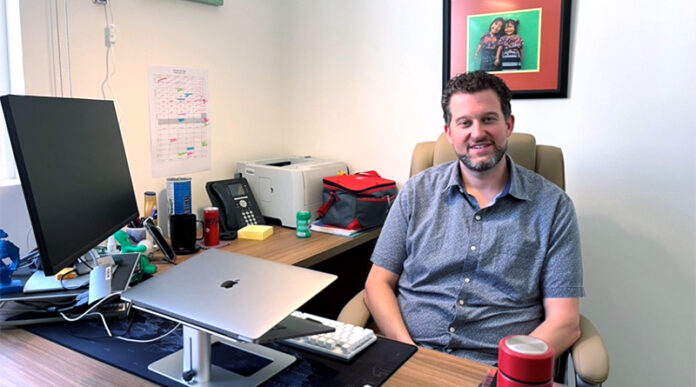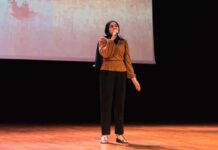By Emmy Yacoub
Dr. Brien Ashdown is an associate professor of psychology at the American University of Sharjah. His work mainly focuses on community, social and development psychology. He is also the chair of AUS’ institutional review board.
What are the trending areas of future research and development in psychology?
Well, with what is going on just in the world generally, there is a lot of interest in artificial intelligence and how that interacts with human behavior. This is gonna be an area where there will be a lot of new research and direction. There are interesting places where neuroscience is going, especially related to culture and how culture might impact neuroscience in the way that brain structure, genetics, culture and environment interact on a genetic and cellular level. It’s starting to gain a lot of attention.
What are some roles you think AI can play in psychological research?
What we are seeing now is like ChatGPT. We are going to see more direct involvement of AI programming helping with designing research studies, maybe developing protocols for research, probably making it easier for people to work across international borders.
Do you think AI could help in therapy and treating patients with psychological disorders?
I think at some point soon, it will. I know already aspects of AI are being used in training new clinical psychologists and therapists. Its role will get stronger as AI improves.
What do you mean by the future dark side for community development in one of your research studies?
In the papers that we have talked about the dark side in stuff about community development is about avoiding mostly unintended consequences that lead to causing damage in communities when community psychologists or community development people go to work. They need to be very careful about some of the negative consequences that can come from inserting yourself in a community and working with a community that is not your own.
How do you think people can recover from the mental health impact of the COVID-19 pandemic?
I think people need to realize that things are probably not going to go back to how they were before completely. When something like this happens, things change, so we can’t expect everything to be perfectly the same but also realize that people are resilient and we can get back to a sense of health and normality and wellbeing and that it might take time. But stress and resilience are processes that communities and people work through and can become better at.
What are your tips on maintaining resilience and well-being during stressful time periods?
I would say it’s thinking about welling and resilience as a process. It’s not something that you either have or don’t have, but it’s getting yourself to recognize and think through that wellbeing and resilience are things you develop and so you can practice and get better at them rather than getting frustrated that you feel like you have to do it a certain way or not.
How do community psychologists decide how and where to begin solving a worldwide problem?
It goes back to the idea of a needs assessment and figuring out where they are needed based on needs assessments, evidence and then their own expertise about what they can or can’t provide, recognizing where their strengths are, where they should go, where their weaknesses are and where they should avoid, which kind of relates to the dark sides argument I was making before about making sure you are only doing good.
How do psychologists decrease victim blaming in societies?
I think the main way of doing that is focusing on strength-based approaches and not necessarily on what has gone wrong and why but recognizing there are issues that need to be solved and then focusing on the strengths that the community have to try solve those problems. If we focus too much on why they went wrong, then I think we will fall into victim blaming.
What roles do you think psychologists are currently playing in the Turkey and Syria earthquakes?
I would assume they are there working in different capacities as counselors and clinicians but also as community psychologists trying to establish increased resilience and programming, but I am not sure. I have not heard much about what they are actually doing there.
What are the best practices for psychologists to help increase the wellbeing of communities?
I think the number one best practice is to ensure they are working with the community and that they are developing things that the community want or need themselves rather than trying to impose something from the outside.
What should communities do to support the special education needs and disabilities on a psychological level?
It’s not really much of my area, but I would say any kinds of preventions or interventions need to be focused around first a needs assessment and really figuring out what is needed and that should be what answers the question about what communities should be supported in doing. First, we need to have actual evidence and information on what is needed before we try to come up with a solution. It is too common that we try to come up with a solution to something that we don’t know what the need is yet.
Recently, there have been news about black and poor communities being victims of environmental injustice due to climate change. Is there a role for psychologists to play in shaping the environmental awareness and injustice?
Sure, I know a lot of psychologists are working in issues related to environmental topics. There are even a few people among psychologists who call themselves environmental psychologists and are trying to work with policy makers and the public to change attitudes and make sure that any work being done on environmental issues is approaching it in a just and fair way as much as possible.
How do you suggest people value equity, diversity and inclusion as a part of their daily interactions with others?
I think we just have to be aware of the role they play. These are things that come from social and cultural values and practices and from awareness and recognizing the importance of valuing diversity and justice.


















